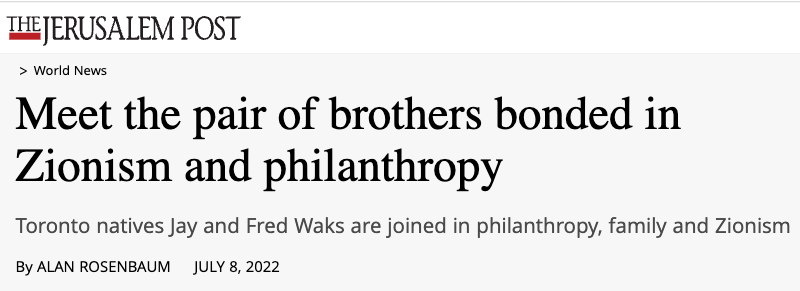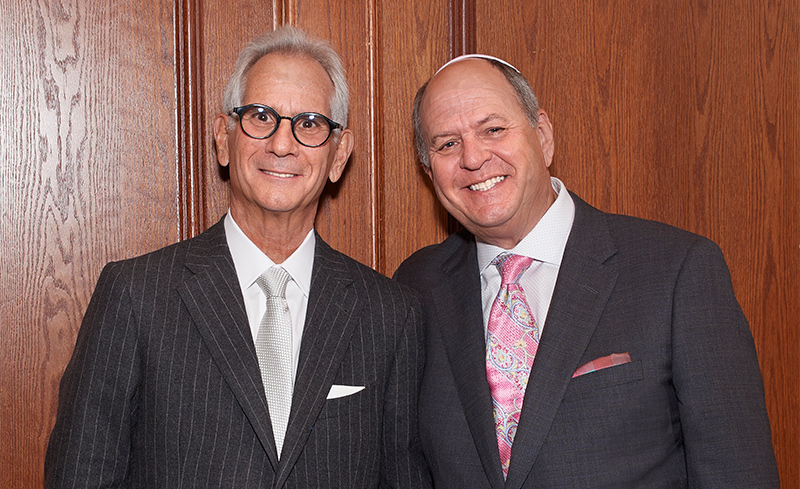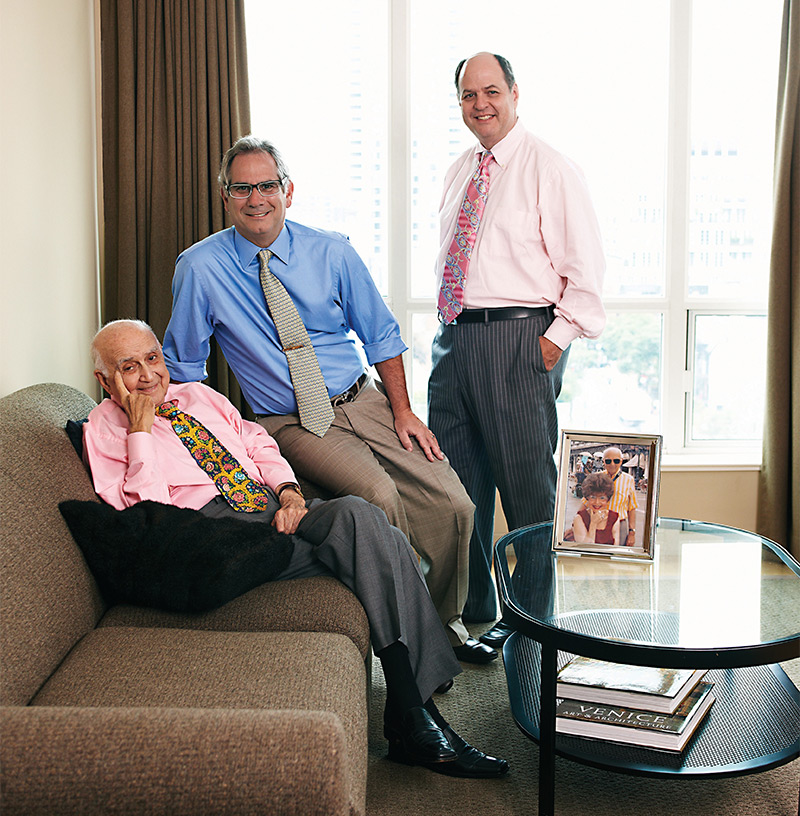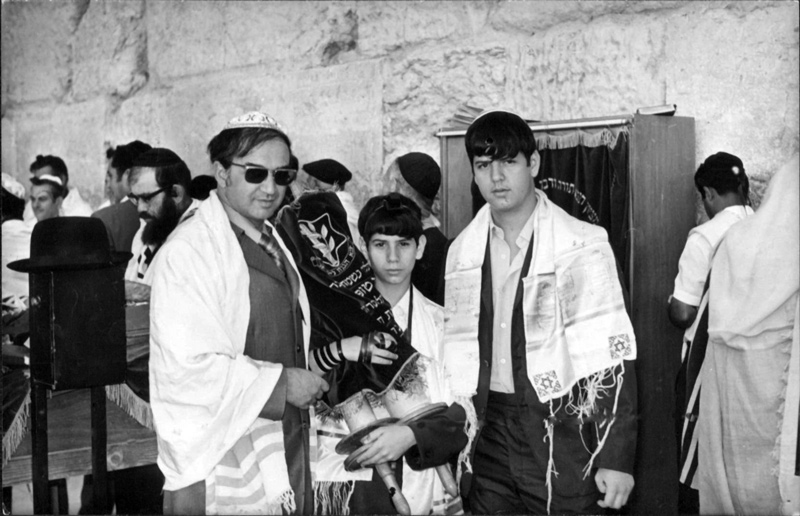

‘My father said that your name is your legacy,” says Fred Waks. “If you lose your name, you’ve lost everything. How do you lose your name? By not being a mensch.”
If there is one word that dominates my discussion with Torontonians Jay and Fred Waks, it is the word “mensch.” Merriam-Webster defines the term as “a person of integrity and honor,” and the two brothers have successfully integrated this quality into their relationships with their families, the Jewish world and the greater Toronto community.
In the course of our 40-minute Zoom conversation, the pair speak about the importance of philanthropy and its lasting legacy, why Israel is important to them, and their unique brotherly bond.

Fred Waks, 65, slim, garrulous and gray-haired, is the president of Trinity Development, a major Canadian real estate development company, and older brother Jay, 67, quiet but with a broad smile, heads Adams and Waks Construction, the firm that was initially started by their late father, Henry Waks, a Holocaust survivor from Lodz, whose immediate family perished in the Holocaust.
Fred, who has four daughters, says that an illness in the family caused him to adjust his priorities in life.“I have a daughter who almost passed away, and that changed my life in terms of grounding me and understanding there’s more to what you need than just the material things. It was a real wake-up call for me,” he says.

Fred began his involvement in charitable work, and since then has been involved with a multitude of organizations, including Jewish National Fund, the Canadian Society for Yad Vashem and Shaarei Shomayim Congregation. He was chairman of the Sunnybrook Foundation, served as cochairman of the United Jewish Appeal, led emergency campaigns during the Second Lebanon War in 2006 and in Operation Protective Edge in 2014. He is the chairman of the board of directors of the Friends of the Simon Wiesenthal Center Canada and, in addition to his own generosity, is known as a crack fundraiser for Jewish causes.
“I’m forever asking people for money, and I’m surprised people still talk to me,” he says jokingly. “I’m surprised that people don’t run across the street when they see me. In the end, though, I’m not asking for me – I’m asking for the institution.”
Fred attributes his extensive participation in charitable activities to his competitive nature.
“I just went for it because I’m highly competitive,” he says. “Jews aren’t athletes, so they may as well use their heads. Literally, all my business has been leveraged for the betterment of our community and the State of Israel.”
He adds that he has learned that one cannot take anything for granted in this life. “Life can change so quickly, and we need to appreciate what we have.”

As proof, he mentions his father, who grew up in a wealthy, sophisticated family before World War II, and “it was gone in a second,” he says.
Adding a cautionary note to the current state of world affairs, Fred says, “If we watch what is happening in the world right now, and we see the rise of antisemitism, we can see that Israel is world Jewry’s safety net. Without it, we have nothing.”
Fred says that he finds his charitable work to be very gratifying. “First of all, we’re doing good. Tikkun olam – repairing the world – is setting a precedent for my children and my family, and it’s extremely meaningful.”He adds that his charitable endeavors have enabled him to meet many interesting people along the way, including Henry Kissinger, former US secretary of state, who served in Europe during World War II. “Henry Kissinger liberated my father. I got to meet him and thanked him for liberating my father, because he was cohosting a dinner with Shimon Peres.”
He adds that meeting well-known people through his charitable activities motivates him to become a better person.Older brother Jay says that he received a legacy from his father about the importance of giving charity and being a mensch.
“Yesterday was my father’s birthday,” says Jay, “and I went to visit his grave at the cemetery. On the tombstone are the words, ‘A man dedicated to his legacy.’ Giving charity was extremely important for him – particularly to the State of Israel.”
Fred adds, “He was not a man of religion. But he was a devout Zionist.”

The mention of Israel and Zionism is an appropriate segue for Fred’s recounting his bar mitzvah, which was celebrated in Jerusalem in 1970.
“We did a tour of Europe,” recalls Fred with a smile, “and we refused to go to France, because the French were selling Mirage fighter jets to the Arabs. Back then, I learned my first semblance of boycotting and having a principled approach at the age of 13.”
Fred says that the family’s attachment to the Hebrew University of Jerusalem dates back to their maternal grandfather, who used to wear a Hebrew University pin on his lapel.“Whenever the rabbi came over to ask them for money,” he quips, “he would be wearing his Hebrew University pin to make sure that he was covered.”
After their mother, Sylvia, died, their father decided to make a multimillion-dollar gift to Hebrew University in memory of his wife.
“It was a very important part of what he wanted as the legacy of the Waks family,” says Fred.In addition, the Waks family made a significant donation in memory of their parents, Henry and Sylvia Waks, naming a floor after them at the Institute for Medical Research Israel-Canada at the Faculty of Medicine at Hebrew University.
Jay, who has managed the family’s charitable contributions to the Hebrew University, says that the school’s intellectual and progressive nature appealed to the family. “There was an attraction to it, and I thought they brought a lot of hope and promise.”
Jay also manages the family’s support of Baycrest Health Sciences, a research and teaching hospital for the elderly in Toronto.
The Waks brothers have succeeded and thrived in Toronto, and Fred says that there is something special about the generosity of the community. “Pound for pound, Toronto has always given the highest amount to Israel per capita in North America, particularly when it comes to emergency campaigns in Israel.”
Jay suggests that unlike the American melting pot, which can remove one’s identity, Canadian society operates on the principle of a mosaic, which enables people of different ethnic groups, including Jews, to retain their identity.As our wide-ranging conversation ends, Fred brings up the uniqueness of the bond he and his brother share. “We speak three times a day, we travel together, we do everything together. There’s a uniqueness in the bond that we have. My father, before he passed away, said, ‘I can now leave this earth because my boys love each other.’”
Adds Jay, “We support each other and each other’s charitable interests. We’ve got each other’s backs.”
Jay and Fred Waks are the featured guests in the latest episode of The Philanthropists, a video series hosted by Canadian television and radio personality Ralph Benmergui. Presented by the Canadian Friends of Hebrew University, the episode will air on The Jerusalem Post’s website on Tuesday, July 12.